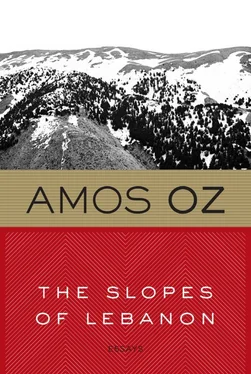Indeed, if we are to judge by his speeches during that war, Menachem Begin went into Lebanon to fight a worldwide war against the enemies of Israel, from Amalek to Chmielnicki to Hitler: an awesome retribution for all that the Jews had suffered. Once and for all.
“We love you, precious Homeland / in joy, in song, and toil / Down from the slopes of Lebanon to the shores of the Dead Sea / We will rake your fields with plows….” On June 9, the Israeli Air Force swept away virtually all the ground-to-air missiles the Syrians had installed in the Lebanon rift (without asking our permission!). In air battles that same day, twenty-nine Syrian planes were shot down, with all Israeli planes returning safely to their base. The following day, the Syrian forces were struck near Lake Karoun and the Syrian First Division was defeated in heavy armored fighting. During the night between June 10 and 11, an Israeli spearhead force reached the Beirut-Damascus highway. The Lebanese capital was cut off. (I am told that the code name for Beirut in Israel Defense Forces documents was “Bar-Lev,” which is not only the name of Haim Bar-Lev, the Israeli Army’s deputy chief of staff during the Six-Day War, but the Hebrew acronym for Birat Levanon — the capital of Lebanon.) Fifteen thousand Syrian soldiers and PLO fighters were trapped in what Arafat would later glorify as “the Palestinian Stalingrad.”
Y. came over to see me later that evening. “You see?” he said. “We screwed them quick, hard, and neat.” “This won’t end well,” I said. I didn’t know what else I could have told him. “Are you starting that all over again?” said Y. “You’d do better if you got up the courage to send an article to Davar, that newspaper of yours, retracting all those gloom-and-doom prophecies you’ve been publishing these last few days. You’re making a fool of yourself.”
Then came the cease-fire of June 11, which wasn’t a cease-fire. And after that came the battles of Aley and Bachamdoun and Baabdeh and the Galerie Semaine Square, spiced with parties and fancy banquets given by the Christian Phalangists (as their contribution toward their own liberation) honoring officers of the Israel Defense Forces and delegations of Israeli dignitaries. Then came two months of cruel siege of the city of Beirut, including massive shelling of residential neighborhoods, which cut off electricity and water. Meanwhile, in Israel, the rift deepened between those who supported the war and the critics who publicly demonstrated their protest. There was controversy even among the soldiers, many of whom discovered they had fallen victim to a cynical lie — that they were being used to achieve objectives of which no one could have conceived at the beginning of the “operation.” High-ranking army commanders aired criticism of the plan to enter West Beirut. Colonel Eli Geva was relieved of his command and dismissed from the army because of his refusal to take part, as commander, in an operation he considered unconscionable. Public opinion in Western nations was not ecstatic about the Israeli crusade “to rescue the Christians in Lebanon.” Strong criticism of the military operation quickly escalated into poisonous criticism of Israel and of Zionism itself, with more and more blatantly anti-Semitic undertones.
On August 21, in accordance with an agreement reached under American auspices, the beleaguered Syrian and PLO forces were evacuated from West Beirut. A multinational force was supposed to take their place in the city. Two days later Bashir Gemayel was elected president of Lebanon by the vote of a phony parliament ringed by Israeli tanks. Within three weeks Gemayel was murdered by Syrian agents, and the Israel Defense Forces quickly took control of West Beirut. In coordination with the Israel Defense Forces, the heroic Phalangists, who until then had not lifted a finger to help “save the Christians,” took upon themselves the task of “purifying” the Palestinian refugee camps in the city. Within earshot of Israeli army positions, the illustrious Phalangist heroes of Eli Houbeike and his cohorts, their way lighted by flares of the Israeli Army, slaughtered men, women, and children in the Shatilla and Sabra camps. *“The Phalangists went overboard this time,” said Chief of Staff Eitan without elaborating. Speech is silver….
Then from all the radio stations, simultaneously — as though by command from the top — the charming Hebrew melodies suddenly vanished. The Israeli nightingale seemed to have swallowed its tongue. Other songbirds were heard in the land, including the grenade explosion that murdered Emil Grunzweig, the Peace Now demonstrator, and wounded some of his friends in the square in front of Begin’s office.
And then began the retreat from Lebanon and in its wake came amnesia. Uncle Sharon was forced to leave, Uncle Raful, the chief of staff, went away, and Grandpa Begin was gathered up into his own bosom. The entire Lebanon War was retired to the cellars of collective oblivion. Some seven hundred soldiers were gone, along with thousands of the enemy. And gone, too, it is said, were more than ten thousand civilians, “innocent” even in the vocabulary of those who had abetted the crime.
And in time we started playing those melodies again—“How Shall I Bless,” “He Will Bring Us,” and “Would That Buds Could Speak.”
It is time to go back to the beginning — the beginning of that war. To a picture of Menachem Begin, pale, leaning on a cane, surrounded by his generals and his advisers, at the top of captured Beaufort, the old Crusader castle in southern Lebanon. The blood of the dead from the previous night’s battle has not yet dried beneath his feet, but this man is standing there, “tired but happy.” Happy? Gleeful and arrogant, crowing that this “great” fortress had been captured “with no losses.” And with fatherly satisfaction, he questions one of the stunned soldiers: “What used to be over here? Machine guns?” Then, as though assuming the role of a biblical king in a Cecil B. De Mille spectacular, he “bestows” Beaufort upon the armies of Major Haddad.
Thus began the new era: King Solomon granted “forty cities” as a gift to Hiram, king of Tyre; Israel dispensed fiefdoms to its vassals.
This was only the prologue. Several days later, the prime minister appeared on television, bemused, sarcastic, in a verbal blast against all the Gentile hypocrites (“Look who dares preach morality to us!”). He trampled upon his domestic opponents, promoted Arafat to the rank of a new Hitler, and in the next breath demoted him to the rank of a “hairy-faced” two-legged beast, treating viewers at home to a “strategic” comparison in which he contrasted “Hannibal who had outflanked the Romans one way,” with his own minions, “who had, on the contrary, outflanked both this way and that.” What his words did not reveal was written on his face: He was smug. To listen to him, the war seemed like a toy that had finally been presented to him after a long, frustrating wait, which had gone on, perhaps, since his youth. Pugnacious, petty, and vengeful toward his opponents, and indifferent to the horrors of the war, he was consumed by a hatred of “the Gentile world,” born of a feeling of inferiority that was cloaked in a pose of sarcastic superiority. “And now,” he happily promised us, “there will be peace in the land for forty years.”
As fate would have it, several months later Begin himself became a “hairy-faced” man. Photographers were requested to show tact and to refrain from photographing him with the stubble of mourning he had grown in accordance with religious custom after the death of his wife and, later, not with the beard he grew because he was stricken by a skin disease. Some say he was stricken by remorse as well.
But what do I care about Begin? May he find a little peace in his seclusion. We will cast no stone on his sufferings. The guilt for Lebanon lies not with Begin alone, and certainly not just with Eitan and Sharon, who carried out his orders (or carried out his orders and then some). We will have to grit our teeth and admit that this war was a war of the people. The people wanted it and the people (most of them) supported it, took pleasure in it, and hated the handful who were opposed. At least that is how it was until the war got “bogged down”; at that point, this good people simply forgot about the war and its dead.
Читать дальше












